Hey everyone! I had been thinking for some time about writing an entry about food, and the perfect opportunity has presented itself, since that is what Ms. Paquette’s class was discussing this week. Like last week, four 1st-grade students have asked me questions about Burkina Faso, this time about mangoes, oranges, freezers and fish. Also like last week, the answers are specifically directed towards the students, but will hopefully have something for everyone – hope you enjoy it!
_______________________________________________________________
Do some people eat mangoes in Burkina Faso? – Damian
Thanks for your question Damian! Mangoes are a really popular fruit in Burkina Faso, especially among visitors like me, who don’t eat them that often at home. But there’s a catch! In Canada, we receive fruit from all over the world, meaning we can have just about any fruit at any time of year, or almost.
Here in Burkina, some food is also imported (brought in from other countries), but a whole lot less than back home, and it’s mostly cereals like wheat, rather than fruit. What does all of this mean for mangoes? Well, mangoes are seasonal, which means they only grow at certain times of year. So, since they’re produced in Burkina itself and not imported from far away countries, it needs to be mango season to be able to eat them… and wouldn’t you know it, I arrived at the very moment mango season ended: I haven’t had a single mango since I arrived here! Too bad – apparently, they’re delicious! For now though, I’m getting by with watermelon and papaya.
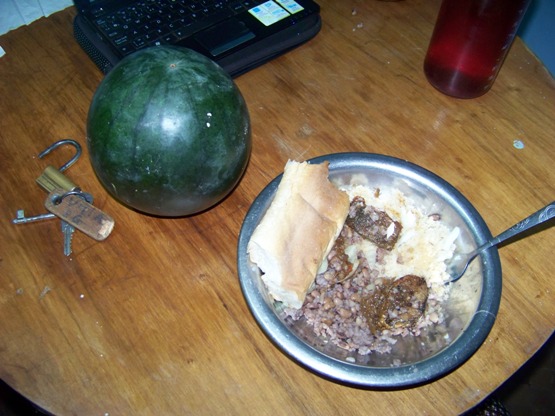
Watermelon is often a lot greener here. The other day, I had half a watermelon for breakfast, and the other half for lunch - and that was all I had!
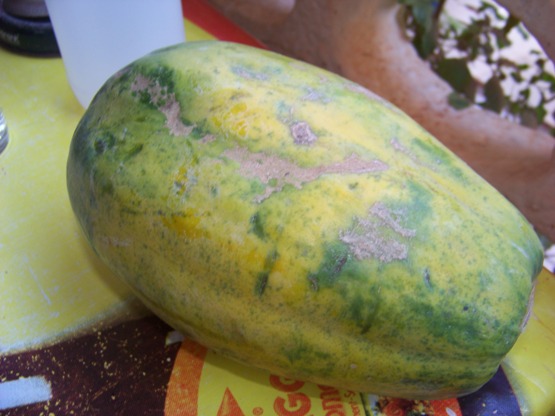
Papayas here, for me, replace cantaloupe: they're orange on the inside and I eat them about as often!
Do oranges grow in Africa? – Alex
Hi Alex, thanks for your question! Oranges do grow in Africa, and there’s a good chance you’ve already had some African oranges yourself. As we talked about in the last question, Canada imports all sorts of food, fruit in particular. A lot of oranges in Canada come from California or Florida, but some also come all the way from Africa. Ask your parents what kind of oranges they buy!
As for oranges in Burkina Faso specifically, they grow here too. It’s very unlikely that you’ve ever had a Burkinabè orange though, since they don’t export them (sell them to other countries) very much. Since I’ve been here, I’ve had oranges a few times. I’ve even also been on a plantation where a friend of mine grows lemons. To get the lemons, we took a stick and whacked the lemon tree, which would make the lemons fall so we could pick them up. I almost stirred up a wasp nest this way, but my friend, who has a much keener eye than me, saved me just in time.
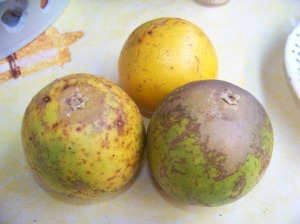
The orange in the back is almost orange, but that's a rarity. The green and yellow ones are the standard.
So, back to oranges. The oranges here have a peculiar characteristic compared to those I’d had before: they’re not orange! Instead, they’re usually a yellowish green. Earlier, I said I’d only had a few. That’s because that color seems to come across in the taste as well: they’re harder and more sour than the oranges I’m used to at home. In fact, they taste a bit like lemons!
How do people freeze food? – Aidan
That’s a good question Aidan, thanks! The short answer is that they don’t. In the city, store owners will generally have a fridge and a freezer, but, at home, most people do not. In the villages, where there is often no electricity, refrigeration doesn’t really exist at all.
In the city, people will usually buy food and eat it the same day, or buy food that can be conserved a few days. Except, with the heat here (in some places, 30 degrees is considered a cold day!), conservation is all the more difficult. I’ve had a few nasty surprises trying to keep food that would have lasted two or three days on my home counter in Canada, but that went bad after just 24 hours here. My host brother has a fridge, but it doesn’t work anymore, so right now it just acts as a cupboard. That’s another thing: with the heat, refrigeration devices tend to break down a whole lot more!
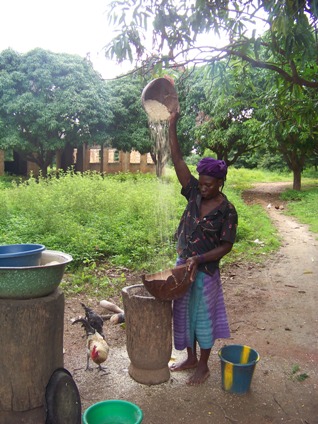
My host mother in Kayero, preparing some millet or corn, I don't remember which, to be eaten that same night.
In the villages, what you farm is what you eat. That means that people eat a whole lot less variety than we do in Canada. When I spent a week in the village of Kayero, it was not unusual to eat a meal made out of corn three times a day. There, the harvest is conserved throughout the year without any kind of refrigeration, and everyday a little bit is used to feed the family. The food is usually transformed from its original form and prepared all on the very same day, so just preparing food is a big daily activity! I helped out a little bit, and some of it can become really tiring!
Do you cook fish and how do you eat it? – Brendan
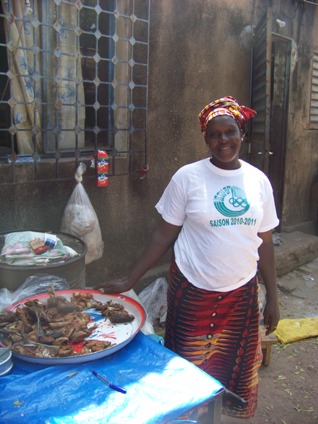
Everyone knows Madame Barro, one of the only sources of food on campus right now, until the students figure out their catering. She's a real entrepreneur!
Brendan, you figured out the one food that I’ve had almost every day for the last two weeks, fish! Thanks for your question. For a land-locked country (meaning it doesn’t have any coastline) you can find a surprisingly large amount of fish here. People fish in rivers and lakes, and since where I’ve been staying lately is right by a river, fish is an easier dish to come by than chicken, beef or lamb. I don’t cook the fish myself (nor do I really prepare any of my food) but rather go buy it from my neighbour, a lady who cooks for a lot of people, including me, at a small cost.
She cleans the fish in water, fries it over a fire, then cuts it up into different little pieces to sell them. As for how I eat it, let’s just say that when you eat fish here, it still looks like a fish. I can have either a fish tail (20 to 30 cents), a slice of the body (10 or 20 cents, depending on the size) or the fish head (30 cents). (By the way, those are standard village prices for this kind of food. I usually spend no more than 1-2$/day to feed myself in this particular spot. In the city, it’s a lot more expensive though!)
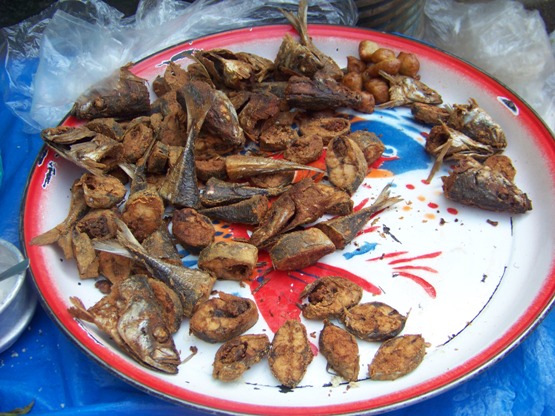
All the fish you cant eat - and all of the fish to eat too! I usually have only one or two pieces though.
I haven’t built up the courage yet to have the fish head myself, but people here eat it up. They’ll often gulp down the whole head, only spitting out the eyes. Whatever piece I have, I almost always have it on a bed of rice, noodles, beans or atieke, which is a bit like couscous.
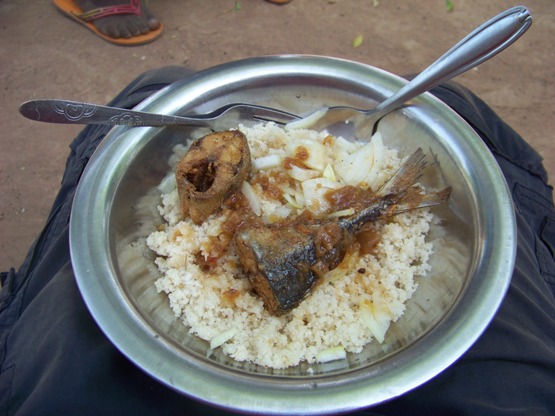
Here is a fish tail and a slice of body on a bed of atieke. Usually, you don't use utensils to eat this, but I do it half-half.
I’m doing okay with fish, but right after I finish posting this blog entry, since I’m back in the city, I’m going to see if I can find myself a burger! (Yes, you can find burgers here too, but it’s a lot more difficult than fish, and it’s a lot more expensive too!)
That wraps up the questions for this week! I hope I’ve been able to answer them for you. Keep them coming – I’m already looking forward to this coming week’s.
_______________________________________________________________
For the non-1st graders: I’ll be trying to post one of my traditional blogs this week (probably in French), although this week is presenting itself as a really big one. Thanks for reading, and stay tuned!
One last thing: Happy Birthday Dad!
Dana

Dear Dana,
You seem to be doing really well except for the fish heads!!!!!! I don’t blame you–I couldn’t even eat any part of the fish. Keep up the good work…..we need more people like you!!! Congratulations and best wishes!!
Love, A. Anna xx
Thanks Andrea! My diet has certainly been interesting, but I think I’m managing. I’m back in the city now though, so food is more comfortable but a lot more expensive!
That’s awesome! : ) All the best, Dana!
Thanks Sean! Glad you’re enjoying it. Finished crossing the country on two wheels?
You are missing out mista Dana, fish head is the best part! Crispy goodness!
I’ll take the crispy, but I’m not sure I can get around eating something that looks at me while I eat it. Also, the mouth and the gills are not so appealing. In other words, I just don’t know how I feel about eating face.
Dana, can you picture your mother eating a fish head and spitting out the eyes? Maybe if she had it with a little wine!! 🙂
Dana, I am so impressed with all that you’re doing. Not only are you helping the people in Burkina Faso, you are educating our little grade one students at Good Shepherd School.
You’re awesome!
Thanks Mary! I think she’d need a lot of wine to have a fish head…